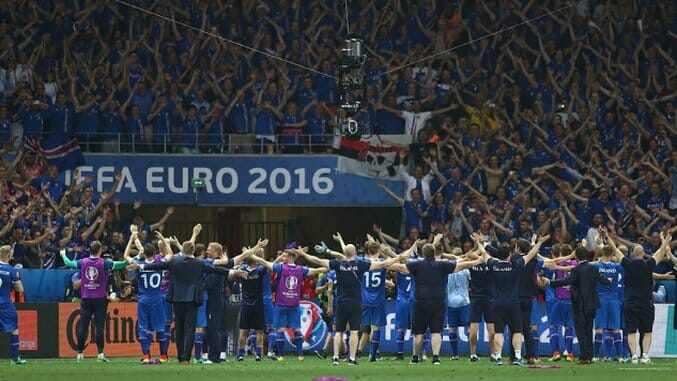The Best Football Writing at Euro 2016
Photo by Lars Baron/Getty
Euro 2016 is over. Whatever you thought of the overall quality of the final, or how satisfied you were with who lifted the trophy, this tournament was full of memorable moments. From the clashes between English and Russian fans earlier in the tournament, to the improbable and heroic campaigns from Wales and Iceland, to Gareth Bale’s manbun, the European Championships held our attention and didn’t let go.
At the beginning of the tournament we put together some strong writing that had been published in the run-up to the first kickoff. We’ve been keeping our eyes open for more excellent words throughout the tournament. While we couldn’t include everything, we’ve compiled a selection of the best pieces in one convenient list.
1. ”When you cheer on the Red Devils, you can’t forget that you are cheering for an idea rather than a reality, and that in a way that idea only exists on the football pitch. The Belgium that takes shape on the pitch is actually so far from the nation it purports to represent. The team, at its best, is coherent, bringing together disparate languages and histories, a place where immigrant communities are not just welcome but understood as fundamental to the future of the nation.”
— Laurent Dubois, on Euro 2016 as a reflection of sociopolitical divisions in Europe.
2. ”I have to be honest – I thought about not going, or leaving the boys at home. But I could not bring myself to surrender to the forces of pessimism and fear. Football and joy must triumph, and I felt quietly proud to be involved. I was perhaps naive in thinking that the worst excesses of England fans would be tamed.”
— Tom Walker, offering a first-hand account of the violence involving England fans.
3. ”There was a poignancy to its airing in Lyon, for it has been a dreamlike existence for Wales fans in France. With their team absent from major tournaments for 58 years, generations in Wales have grown up to expect failure and look on longingly as others contest World Cups and European Championships”
— Dafydd Pritchard, penning the epigraph on Wales’ heroic run.
4. ”Had Tufan not made contact with Turan (or, more fittingly, vice-versa), he likely would have been 1) more aware and 2) far more likely to close down Modric and/or defend the area where the ball eventually lands. Instead, it’s 1-0 to Croatia, and Tufan is left to mourn both the pain in his face and the inevitable chewing out he will receive from Fatih Terim.”
— Our own Taylor Rockwell, breaking down Luka Modric’s goal vs Turkey.
5. ”Carrots. Help you see in the dark. Make you realize that your love of the long, aimless ball lumped toward a tiny center forward is nihilism.”
-

-

-

-

-

-

-

-

-

-

-

-

-

-

-

-

-

-

-

-

-

-

-

-

-

-

-

-

-

-

-

-

-

-

-

-

-

-

-

-











































